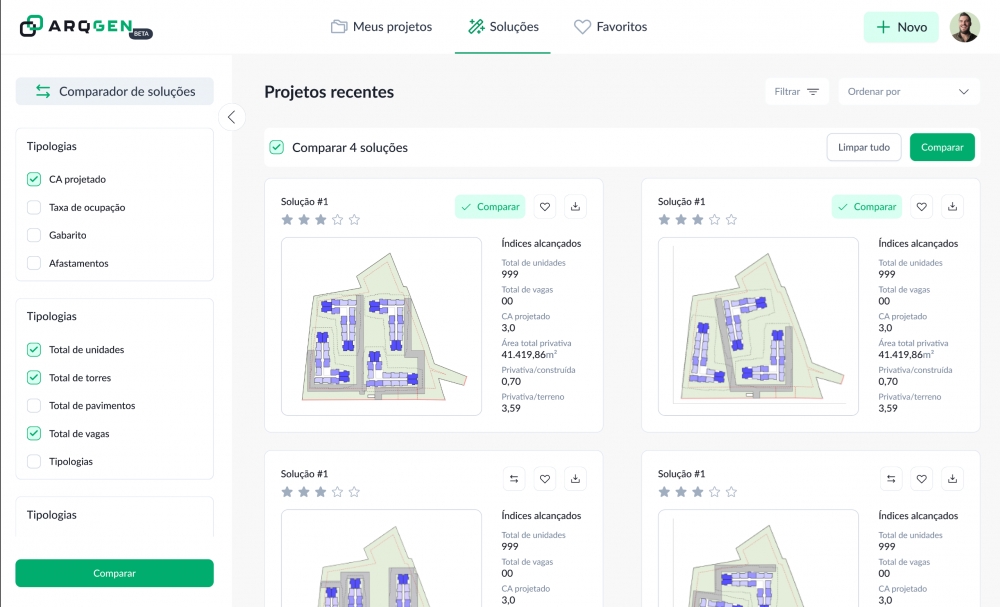


Image: Arqgen
Published on 02/03/2025
By Roseli Andrion | Agência FAPESP – Architects at Arqgen, a startup located in São Paulo city, Brazil, have created a platform that helps property developers optimize their choices. Its functions include project feasibility analysis.
“Property developers often buy land without consulting an architect, usually because they’re in a hurry. This is risky as they don’t know what can actually be built at that location, for example,” says Alexandre Kuroda, architect and co-founder of Arqgen. Major financial losses can result if, as is frequently the case, the land cannot be built on immediately and the developer has to wait until the time is right.
The solution developed by the startup’s architects, with support from FAPESP’s Innovative Research in Small Business Program (PIPE), offers all possible design options for a given space while taking into consideration the planning, environmental and architectural constraints applicable to the site. “This guarantees a significant competitive advantage as well as more precision when choosing land for purchase,” Kuroda says.
If better choices are made in the initial stage of a project, when the developer selects land as a construction site, the ensuing steps are optimized. This helps demonstrate the tool’s value to the market.
The first version of the solution was installed locally. It is currently available from the cloud via a SAAS (software as a service) subscription, with automatic updates. “As a result, it’s scalable in terms of sales and customer service,” Kuroda says. “Customers used to take two to three months to install each new version. Everything we discussed was only seen a long time later.”
Architecture first
According to Kuroda, the system puts architecture first, giving it a strategic rather than merely operational role. “Too much haste and pressure to build can make the whole process very disorganized. We want to give developers strategies for enhancing architectural design quality so that whatever they build is properly insulated, for example, and has an appearance that interacts suitably with the urban context,” he says.
As a result, developers will be able to offer the market top-tier products that are not available via traditional architecture, especially in the case of large-scale projects where units cannot be designed and built on an individual basis. “We want to put architecture first and foremost in projects, as this adds value and will ensure that people are happier and live better lives in the future” Koruda says.
Arqgen also has a solution that can be used to plan interiors and organize spaces, taking into account information about the property and the preferred design style. Based on this input, the platform offers a comprehensive range of possibilities and options. “In addition, Arqgen’s system assesses the efficiency of the design, which isn’t feasible when the traditional architectural approach is used. If you’re designing a bank branch, for example, you can use the platform to estimate the distance traveled by a customer to reach a teller and choose the preferred option,” he says.
In addition to offering all possible architectural design options, the system classifies them in accordance with the criteria provided by the user. “This helps users make better choices,” he says.
Savings can be assured via the choice of the most suitable site and the quantities of materials required. “We focus on the most fundamental stage in any project, which is when the key decisions are made. Once these initial definitions are set, from then on everything is more complex because changes to previous stages entail rework and therefore increase costs. If construction has already begun, the problem is even worse, as changes entail demolition of what’s been built. The initial stage has the highest value because it includes decisions involving the quality of the architecture,” he says.
Future plans include the development of customizable solutions, enabling each property owner to design the home or office building they desire, even in the case of large-scale real estate developments. “A great deal of technology is available, and it can help design-in these features right at the start of the project, so as to respect the specific desires and needs of the future users of that architecture,” he says.
Beyond Brazil
Another possible application of the solution is in urban planning. São Paulo city, for example, with its disordered urban sprawl, could benefit from a broad town planning project. “Our scope is smaller. We’re focusing on developers and builders, and ideally on design strategies for specific sites, but the solution can certainly be applied to city planning,” Koruda says.
He and his team are also thinking of internationalization since urban restrictions and the strategies deployed by property developers are similar in other countries besides Brazil. “There are still many opportunities in this country, but we could also offer the solution for customization elsewhere. We want to expand the software for more general use, both here and anywhere in the world,” he says.
The startup’s name, Arqgen, alludes to architecture (in Portuguese, arquitetura) and generative, a term recently popularized by ChatGPT and other generative artificial intelligence tools, although the concept was relatively unknown when the firm was founded in 2020. Moreover, the model is far more sophisticated than those behind the bots that create texts and images basically by web scraping. “For architecture, considerable precision is needed, and that’s not available in those systems. Copying and pasting based on similarity isn’t sufficient for us,” he says.
Source: https://agencia.fapesp.br/53838